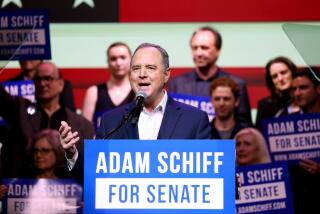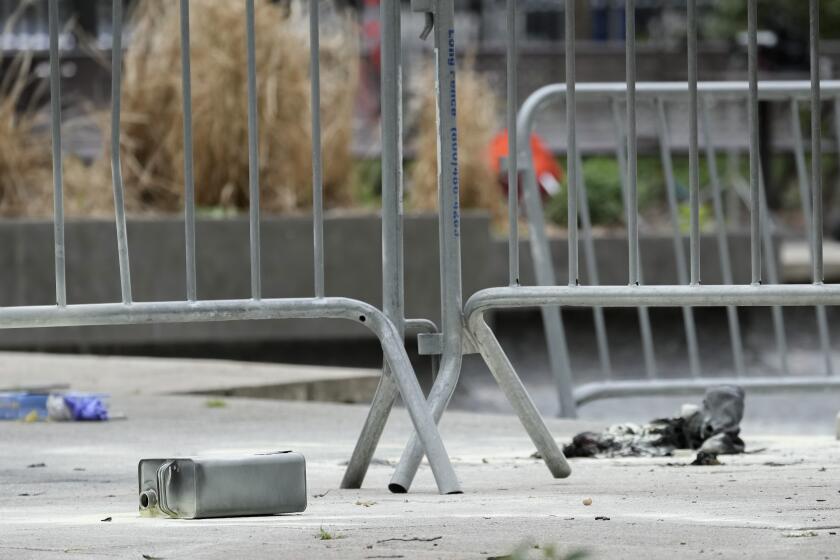Shifting terrain in a GOP proving ground
Turning a South Carolina rally stage into a dance floor, Michele Bachmann grabbed her husband by the hand the other evening and began jitterbugging to the rockabilly beat of Elvis Presley’s “Promised Land.”
Bachmann told the friendly crowd outside Ripley’s Aquarium in Myrtle Beach that she’ll be the Republican candidate against President Obama in 2012 “if South Carolina has anything to say about it.”
This state hasn’t been wrong yet. Its presidential primary has an unblemished record of picking the eventual GOP nominee, serving as a Southern firewall for national front-runners who’ve been able to stop insurgent challengers here every time.
But that firewall may be collapsing; a primary that has reliably served the interests of the Republican establishment for decades may do the opposite next year.
National front-runner Mitt Romney, the sort of candidate who might have been buttressed by South Carolina in the past, hasn’t helped his cause. He skipped a televised debate in Greenville, S.C., and has made just one appearance in the state since last year’s election, though his campaign has begun moving quietly behind the scenes.
Yet if Bachmann or another insurgent wins South Carolina — a distinct possibility — it would reaffirm the “tea party” movement’s rightward pull on the GOP, with uncertain consequences for the nomination fight and for Republican chances of defeating President Obama.
“It’s not business as usual anymore,” said Sheri Few, state director of Bachmann’s campaign. In the past, “the GOP thought they had to reach out to the middle” to win, thus accounting for their embrace of establishment figures. Today, she said, there’s a different formula: “Uniting the conservatives.”
Few, a grass-roots activist who is white, co-wrote an abstinence education curriculum aimed at African Americans, according to the website of a statewide school reform group she heads. She’s part of a conservative movement that elected a fiery tea party Republican, Nikki Haley, as governor in 2010.
“This is a party with a core base that is uninterested in government solutions to problems. It’s interested in the problem called government,” said Tucker Eskew, an advisor to Republican former Gov. Carroll Campbell, an establishment titan in the 1980s and 1990s.
The change began under the last governor, Mark Sanford, a tight-fisted libertarian best-known for an extramarital affair with an Argentine girlfriend that ended his national ambitions.
“Sanford left a mark,” said Eskew, who is unaligned in the presidential race. “The overall mood of the party became anti-big government, anti-government spending and very reluctant to play footsie with people who are regarded as part of the problem.”
Another motivator: Obama’s ascent to the presidency.
“I consider it divine intervention. God wanted him to get in, because we were asleep,” said Ruth Clark, fanning herself in the 100-degree heat at a Bachmann rally in Lexington, S.C. Obama “scared the bejabbers out of me. I had never been fearful for our country till he got in the White House.”
The 51-year-old tea party activist regards Bachmann as fearless — “She’s one tough little cookie” — and less of a compromiser than Mike Huckabee, whom she voted for in the 2008 primary.
South Carolina’s prominent spot in the primary calendar dates from 1980, when strategist Lee Atwater helped move his home state ahead of other Southern primaries to smooth Ronald Reagan’s path to the nomination. Since then, it’s become a bloody battleground.
George W. Bush, reeling from a thumping at the hands of John McCain in the 2000 New Hampshire primary, ran to his rival’s right here and won. Along the way, McCain had to confront smears about his adopted daughter from Bangladesh (that she was his illegitimate black daughter) and attacks on his patriotism (McCain is a Vietnam War veteran). In desperation, McCain ran a TV ad charging Bush with twisting the truth, “like Clinton”; Bush responded with an ad, shot at a South Carolina fishing camp, accusing the senator of impugning his integrity. McCain’s candidacy never recovered.
Huckabee was the most recent insurgent to falter in South Carolina, finishing second last time after a surprise victory in Iowa. Pat Buchanan was derailed here in 1996 after upsetting Bob Dole in New Hampshire.
Bachmann, who spent two days of her announcement swing in South Carolina, is privately wooing the establishment, even if she defies that category. She met in Charleston with a prominent GOP donor, Robert Royall, a retired banker who was ambassador to Tanzania in the George W. Bush administration.
“We aim to be in South Carolina a lot,” Bachmann told 300 supporters in Myrtle Beach. “We want to win South Carolina!”
Among those cheering was Barbara Stoltz, 54, of Ruffin, S.C., who drove more than three hours each way, just to hear Bachmann. “We’re friends on Facebook,” she said.
The best chance for a traditional South Carolina finish — front-runner on top — may be the presence of several insurgent candidates splitting the vote. Along with the Minnesota congresswoman and other contenders, the field may include Texas Gov. Rick Perry, whose potential candidacy is piquing the interest of South Carolina politicians and activists, attracted to his economic message and tough talk.
Glenn McCall, the state’s Republican national committeeman, introduced Bachmann at a town hall meeting that attracted more than 400 people in Rock Hill, and said afterward that Perry “would draw a bigger crowd than this” if he got in.
Romney invested heavily in South Carolina in 2008 but finished a distant fourth. And that was before Obama’s healthcare plan put an unwelcome spotlight on Romney’s record in Massachusetts, where he signed a law that provided a model for the federal insurance mandate that Republicans strongly oppose.
He also faces resistance to his Mormon religion from evangelical Christians, who dominated the 2008 primary. They have eased into the background as fiscal conservatives have become the most visible force in the party, but they remain a major factor.
Romney “has got hills to climb,” said Warren Tompkins, a longtime strategist who helped run the last Romney campaign but is unaligned now. “He’s got to make the case: Who is the real Mitt Romney?”
The front-runner has been lowering expectations. But out of public view, his campaign organizers are starting to work the state, according to party official McCall, who is also neutral.
Romney’s state director, David Raad, said Romney “feels strongly about competing here in South Carolina. He’s going to be here to win, contrary to what folks have written and said.”
One of Romney’s first tasks will be reaching out to elected officials who supported him last time but are back on the sidelines, including Greenville County Councilmen Willis Meadows, 74, and Bob Taylor, 71. They were among 200 at a Bachmann rally in a Greenville shopping center parking lot the other day.
“What she says resonates,” Meadows said. “She would probably be one of the leaders in South Carolina, because she’s not perceived as being part of the establishment and she wouldn’t have as much baggage.”
The former Romney supporters are taking a wait-and-see attitude on 2012, they said. Once Bachmann finished speaking and began greeting supporters individually, the men moved from the back of the crowd to the side of her campaign bus to catch a closer look.
More to Read
Start your day right
Sign up for Essential California for news, features and recommendations from the L.A. Times and beyond in your inbox six days a week.
You may occasionally receive promotional content from the Los Angeles Times.





